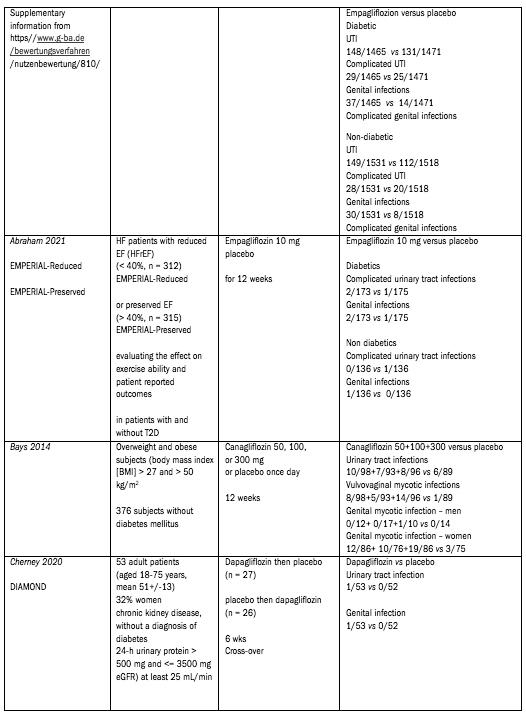
29 minute read
Psychological and sexual problems of cancer survivors
Ida Ayu Made Ari Santi Tisnasari 1 , Tuti Nuraini 2 , Yati Afiyanti 3 , Rudi Rudi 4 , Riri Maria 5
1 Faculty of Nursing, Universitas Indonesia, Depok, Indonesia;
2 Department of Basic Science and Fundamental Nursing, Faculty of Nursing Universitas Indonesia, Depok, Indonesia;
3 Department of Maternity Nursing, Faculty of Nursing Universitas Indonesia, Depok, Indonesia
4 Master of Nursing Program, Faculty of Nursing Universitas Indonesia, Depok, Indonesia;
5 Department of Medical Surgical Nursing, Faculty of Nursing Universitas Indonesia, Depok, Indonesia
Presented as conference papers at the 8th V-BINC at FON Universitas Indonesia
BREAST CANCER SURVIVORS' UNMET NEEDS FOLLOWING CHEMOTHERAPY *
(Ida Ayu Made Ari Santi Tisnasari, Tuti Nuraini, Yati Afiyanti)
Results
Theme 1: overcoming health problems in breast cancer survivors
The first theme that emerged was a need for breast cancer survivors to overcome health problems they were experiencing, along with physical, psychological, social, spiritual, and sexual challenges that resulted All participants experienced health problems that left them physically challenged, such as experiencing fatigue, memory loss, joint stiffness, and changes in physical appearance
“I get tired quickly, you know, easily getting tired It's easy to get tired when you carry it around I'm still actively working I've been brought to work for one hour and two hours I'm already tired I'm so tired ” (P5)
“Yes, sometimes what you want to say is forgotten. For example, when you want to say something like this, it comes out differently Forget about it for a moment Sometimes I ask my father why he keeps forgetting, and friends say maybe it's because of the chemo factor ” (P7)
“In 2019, I had stiffness in my right hand that I felt was going to be almost 5 years after chemotherapy ” (P5)
“After chemo, I lost weight. Because we don't know yet, we think about eating "oh this one can't be; that's also not allowed" It's like stress from eating ” (P4)
Particularly after chemotherapy, breast cancer survivors have often experienced psychological challenges, chiefly fear of recurrence
“There is a sense of worry every time I go for restaging Every time I go for restaging, I get nervous A week before restaging, my husband didn't like to eat, and he was restless at bedtime That happened because we overthink about the bad results; we are afraid that cancer will come back again ” (P3)
“Right now, I'm still worried Moreover, when friends have a recurrence, it's very influential Listening to him metastasize, it feels like our bodies are sick Start by reflecting on yourself ” (P5)
“Worried about the cancer cells coming back or recurrence
I think the survivors must be worried about that too I think so I hope not I really hope it doesn't ” (P11)
Breast cancer survivors, especially after chemotherapy, also reported challenges associated with socializing They felt sensitive, which led them to reduce their social activities
“Yes, due to chemo, sometimes our minds are more sensitive, easily angered, and easily offended I've never been like that before, but I’ve changed a lot since the chemo If someone says something bad, I get offended ” (P14)
“Sometimes I often feel sensitive when the chemo is finished Then if there is a problem, what should be said first to the husband?” (P4)
“After chemo until now, the activity has decreased Now that I have reduced my activities, I feel that I am not as productive as I used to be In terms of social relations, I reduce socialization activities more I don't participate in social activities very often, right?” (P1)
“From a social perspective, if you don't feel confident, you go out to meet friends, reduce your activities with friends outside. So I prefer to stay at home if there are no important activities, maybe go out just for family events or deliver food orders After that, I usually rest at home ” (P3)
All participants in this study faced spiritual challenges, such as questioning their faith or wanting to end their life because they felt alone, despairing, like they had failed to achieve their life goals, or overcome family problems Other participants stated they were disappointed with the hand they had been dealt or felt as if all they ever got out of life were problems
One participant, a 54-year-old woman who was unmarried and childless, stated that she had considered ending her life because she felt alone
“Cancer causes death, it's true I think about death I'm alone: I don't have children, and I don't have a husband So, if no one in this world wished for my existence, it seems better just to die ” (P1)
Another participant, a woman who is 48 years old, has 2 children and is currently experiencing metastases, stated that she had problems with her partner, who is currently having another woman Here's the expression:
“Oops, I'm too lazy to get the treatment It's a thought to die I cried all the times when I found out my husband was cheating on me I feel like dying, especially when I remember my husband and family, who didn't support me My husband's family supported my husband with another woman even though I was undergoing cancer therapy at the time My heart was broken at that time I just wanted to die ” (P8)
The next participant, a 34-year-old young woman who works as a notary, stated that she felt hopeless because of the pain she was experiencing and felt better returning to the creator along with her statement I felt like I was desperate because of this pain I had a feeling that I wanted to just die like that I think it would be better if I were taken like that That's how I felt The important thing is that I've tried If, for example, it's time, I'll leave it to God I always think that way (P11)
Another participant, a 42-year-old woman, a housewife, expressed her disappointment with the fate that is currently happening to her This participant shared that she often helps her friends and prays for charity; however, she still experiences a bad fate in her life, as follows: Yes, I used to want to die, but I also thought that the children were still young and my husband was too In fact, I was desperate to kill myself (P14)
A 49-year-old female participant, who works as a housewife, expressed disappointment when she experienced cancer because the participants felt they had tried to maintain their health but turned out to have cancer Participants feel unfairly towards other people who do not take care of their health but do not have cancer
Following her expressions:
“Disappointed maybe I was shocked and disappointed when I found out that I had cancer because I am one of those people who maintain a regular diet while my younger siblings eat carelessly How come they don't get cancer?” (P8)
The female participant, aged 43 years, working as a housewife, felt disappointed because of the problems that came repeatedly, many of which added to the pain experienced, so that the situation felt even worse Here's the story:
“There's a feeling of disappointment How come we live like this? There is a problem of persistent pain that doesn't go away. She thought, "Why did God give me this ordeal?" There have been many problems, plus pain too But I try to live it all sincerely even though it's hard ” (P12)
All participants in this study had experienced challenges among sex and their sexuality, largely materializing as relationship problems with their partner or a lack of selfacceptance, which prevented them from bearing their bodies to others
One participant, a 48-year-old woman who was married and had two children, explained that she experienced physical changes resulting from cancer and its treatment, which made it difficult for her to find sex with her husband pleasurable anymore She described how they found themselves in a desperate situation:
“Initially, after chemotherapy, the relationship between husband and wife was very difficult, until finally we searched for additional information via Google so that it could be resolved I also had time to ask the doctor, but they only explained things briefly and concisely “You can search on Google and find the answer, ” he said ” (P3)
Participant 4, a 44-year-old woman who is married and does not have children, explained that there was an impact on her relationship with her husband, namely a reduction in the attractiveness of having sex The following are participant statements:
“There is an impact on intimate relationships with husbands, so it's not like normal people He's a little less passionate than before The feeling of interest is reduced, which is usually the same as often asking if one wants But since the chemotherapy, sometimes I don't want to have sex with my husband In the past, I used to ask first, but now it's not like that ” (P4)
Participant 8, a 49-year-old woman who is married and has two children, revealed that she had problems with her husband because he had turned to another woman The participant stated that her husband wanted to remarry since he was sick The following are statements from the participant:
“When it comes to my relationship with my husband, personally, I have had ups and downs as well When I was sick, my husband had an affair with another woman So, I had to go to the ER myself Well, one day, I was caught last year, in August So I was sick, and my husband wanted to remarry ” (P8)
Participant 9, a 33-year-old woman who works as a notary public, revealed that since she had cancer, she could not cover up her inner defects, so she hoped that her current partner would accept her condition as it is The following are the expressions given by participant about her sexual problems:
“I told you, I don't want to cover up my hidden flaws in my partner I have to be sporty When I start a relationship, I don't want to start with doubts that hiding my identity and past is really bad, really bad perception. So when my partner wanted to be serious, I immediately sat at the table saying I was sick, accept me or not If he doesn't accept my condition, we go back If he accepts my situation, we go forward I said so ” (P9)
Another participant, a 34-year-old woman, reported that she feared a lack of acceptance from the man She felt insecure about her imperfections after undergoing cancer treatment The following of her statement:
“So, I feel like I'm being shunned When I'm sick, I feel like I'm being shunned or left out I feel more like that than normal, and it affects my confidence anyway Today, I'm still learning to cope I am aware that the opposite sex, men, want the perfect partner, right? So, if I am self-assured and bare myself to the opposite sex, I always wonder whether or not he will accept my condition as it is now, not to mention my status as a survivor ” (P11)
Theme 2: the need to access the best health services
A second theme that appeared in this investigation was the need to access the best health services, which women considered to involve accurate cancer-detection tools and friendly nurses
Several participants expressed their desire to access health services with more accurate cancer-detection tools than those currently at their disposal
One participant, a 48-year-old woman, explained the importance of introducing PET scanning equipment at the nearest hospital so that cancer survivors who wish to use this facility do not need to travel far for an examination The participant expressed herself as follows:
“I just want a PET scan You can't use Indonesian Government Health Insurance, and the scanner's not here; it's only in Jakarta So, why is a PET scan important? Because we, as survivors, need to know where else this cancer cell is hiding Well, it can only be known through a PET scan We can't get one here; we have to go to Jakarta and it is costly ” (P3)
Participant 6, a 55-year-old woman who works as a housewife, explained the need for a nearby bone scan because the results are more accurate than using only X-rays for accurate staging results This tool is expected to exist to prevent errors in detecting cancer metastases in breast cancer survivors
“The only thing that needs to be fixed is the Oncology Polyclinic, actually If there is a bone scan tool in Local Hospital, that would be amazing Because at that time, in the results of the bone survey, there was an incident that I was thought to have had metastases to the brain at that time I'm paranoid When the results are in, I go straight to Jakarta for a bone scan Bone scan accuracy is higher than x-rays At least it's a relief if you have a result like that, right? So that's why we need a second opinion with such a sophisticated tool ” (P6)
Meanwhile, participant 12, a 43-year-old woman who works as a housewife, explained the need for a bone scan or pet scan so that the results of the examination are not erroneous as in previous experiences
“From the beginning, I didn't know what the examination was going to be like At first, when I was caught sick, I was told to check the FNAB from a regional hospital, where it was said that I had a malignant tumor. Then I was referred to Hospital and X-rayed The results were good Then he asked to do a biopsy After the biopsy, he said no disease was found That's how it was again re-checked at the biopsy Suddenly, at the operation, he said there was a malignant tumor, and her breast was immediately removed So, I want there to be a bone scan or a pet scan here so that the results of the examination are not as wrong as before. I used to also have to go to Jakarta to check by bone scan ” (P12)
Several participants expressed the hope that any future treatment of theirs would be provided by nurses who were friendly to patients and cancer survivors
One participant, a 54-year-old woman, commented that she had been treated unkindly by the existing nurses: “In the oncology polyclinic, there are some nurses who are not friendly So, the nurses ’ words are often firm, but sometimes, I mean the nurse is really mean ” (P1)
Another participant, a 48-year-old woman, described older nurses as feistier than those who were younger “If the nurse is from the old school, they will be lazier and more aggressive They tend to not like seeing patients spoiled
If you are in the oncology polyclinic, do not be surprised if there are nurses who are very fierce But maybe they are fierce because of the pressure they face due to the very large number of patients, right?” (P3)
Participant 7, a 50-year-old woman who works as a housewife, explained that there are nurses who are emotional
“Indeed, my friends say that there are nurses, especially those who are on duty at the oncology polyclinic, so fierce that they have shouted at the control person at the oncology polyclinic ” (P7)
Participant 8, a 48-year-old woman who works as a housewife, stated that she wanted the unfriendly nurse service she had experienced to be changed to a morefriendly service because, according to the participant, the attention of a patient was not only physical but also a patient's comfort
“In the inpatient room, a nurse came in, the nurse grumbled, saying she didn't like messy rooms Why is the nurse being so bitchy? Such services must be changed The nursing profession should pay attention not only to the physical condition of the patient but also to their comfort ” (P8)
Theme 3: unmet information needs about cancer treatment
Several cancer survivors expressed that they wanted more information, including about the stages of treatment, how to overcome the side effects of cancer therapy, and information technology resources to accompany their cancer treatment One participant, a woman aged 48 years, remarked that healthcare workers do not explain the stages of treatment unless they are asked This leaves some, especially women from remote areas, confused about or unaware of the treatment stages they will undergo The following is a related excerpt:
“So, if we don't ask, the staff don't talk and don't tell us about t h e s t a g e s o f t r e a t m e n t P e o p l e f r o m v i l l a g e s s u c h a s Karangasem and Tabanan don't understand what they are going to do after this. They don't know because not every patient is accompanied Not every patient understands what is being explained ” (P3)
Participant 10, a 37-year-old woman who works as a private employee, explained that patients must ask first or find out on their own to get the necessary information Some participants even said they had to eavesdrop on other patients' conversations to get useful information to overcome the side effects of the therapy they felt
“
So far, this is my experience We have to ask first, especially if you are dealing with the side effects of chemo So that's my trick I heard from friends there too From the results of my eavesdropping with those friends, I finished chemo looking for the food I wanted first For maybe a few days, I will not be able to eat That's very helpful You can eat a little bit of it ” (P10)
Several participants expressed the need for detailed health information Participant 5, a 47-year-old woman who works as an entrepreneur, explained that the health information provided to patients must be detailed Participants felt that it was necessary to explain the latest treatment information The following are participant statements:
“If we don't ask, the officers only follow the medical history according to the medical record If I asked for additional treatment, the staff would not be there There are additional checks that sometimes we are not informed about, even though they are covered by government health insurance ” (P5)
Participant 9, a 33-year-old woman who works as a notary public, explained that it is necessary to provide information technology for cancer treatment This is considered important by participants to speed up the examination process so that participants are expected not to feel tired with the existing queues The following are statements from participants:
“It is enough with technology such as mobile applications; the examination files should be ongoing If I wait at the hospital, first I'm tired, and second, I'm full That was before COVID19 That's incredible exhaustion Imagine at the time of COVID-19 what the treatment would be I think the world of health must learn to use technology as a means of efficiency in carrying out health actions ” (P9)
SPECIAL INFORMATION TO DISCUSS SEXUALITY
PROBLEMS: A BALINESE BREAST CANCER SURVIVOR'S UNMET NEED
(Ida Ayu Made Ari Santi, Yati Afiyanti, Tuti Nuraini)
Results
Information needed to overcome sexual problems
Informant 1 was a 45-year-old woman who worked as a housewife and owned a salon, was married and had two children She stated that in the first year of treatment, she did not want to engage in sexual activity because her vagina felt dry
“I need information about how to solve my sexual problem It's dry It's like a razor blade, ma'am, during intercourse It feels very dry Yes, as a wife, yes he also understands Sometimes, I feel sorry for that Sometimes, I don't feel forced I'm also a woman as well... but sometimes, ma'am, after chemo, sometimes we want to do that I do not understand Even though it's dry, the vagina is really dry, but I want us to have sex I don't know, or maybe this is what medicine I want hahaha ”
(Informant 1)
Informant 10 told the researcher that since her illness, her h u s b a n d h a d b e c o m e c l o s e r a n d m o r e c o n c e r n e d However, as a cancer survivor, she was unable to serve her husband sexually although she still wanted to; the pain was severe
Informants 1 and 10 both stated that they had pain during intercourse but still felt obliged to provide sexual services to their husbands Therefore, information on how to meet their sexual needs were urgently needed to solve their sexual problems
According to these informants' experiences, the first year of treatment was very heavy going, and they had no desire for sexual activity, possibly due to the chemo treatment However, after a year of treatment, their desire for sexual activity returned
Informant 2 was 48 years old, had two children, and currently had metastases She stated that she was having problems with her husband, who currently had another woman
“About sexual things? No, it's just them sometimes Maybe it's because they're already sick so don't worry about that anymore, ma'am Let's focus on our health Sometimes, it's okay if he wants to look outside; what's more important, the important thing is that I'm healthy, sometimes my friends especially those who are still on drug therapy, like that Have you thought about that again?” (Informant 2)
Informant 2 focused more on her own treatment and said she didn't care about her husband's sexual needs In fact, she added that she had found her husband with another woman in his room
“But sex with a physical problem due to chemotherapy side effects was extremely upsetting to me The husband acted not that interested in sexual activities, hahaha It looks like I'm the only one who wants to do it that's why I'm sharing about cancer don't feel hopeless ” (Informant 2)
Informant 2 stated that her husband was no longer interested in her; in fact, she had to sleep on the sofa so she could sleep separately from her husband As a result, she experienced lower back pain because she didn't sleep in bed
Informant 5 stated that she did not want to display her body parts when in intimate contact with her husband She could not display her breasts to her spouse when engaging in sexual activities
“I could not engage in normal sexual activity with my husband I had to cover my breast area with a shirt because I was embarrassed to show it to my husband I feel like an imperfect wife to my husband ” (Informant 5)
Family support is needed to get information on sexuality Participants explained that family support greatly influenced the good relationship between participants and their partners Information about sexuality issues provided by the family is very meaningful for building good relationships with partners
“If you marry into a different clan, there is a problem: you cannot return to your family because you are not considered as their family member again ” (Informant 6)
“Family harmony has changed since my illness ” (Informant 7)
“In the family, it is really taboo to discuss sexual needs If there is a problem, it must not be told because it is a matter of shame ” (Informant 8)
“The problem must just be self-contained. That's better.” (Informant 9)
Informants 6, 7, 8, and 9 all stated that they needed support from their families The cancer survivors did not feel any bond with their partner’s family
Healthcare facilities need to provide sexual information
“Well then, there are many ways we can connect To begin with, it seems that many are shy to talk about sex I need more opportunities to discuss my sexual problems with people who are more experts in dealing with sexual problems after cancer therapy ” (Informant 3)
“If you want a discussion about sexual needs, you must ask in a kidding way ” (Informant 11)
Informants 3 and 11 stated that they felt ashamed to discuss their sexual needs Survivors feared discussing their sexual problems due to the taboo around this information
“Yes at least in the community, there is one nurse who is very close to us She was stationed in Sarjiwani She is such a good nurse; she continues to support us, but it seems that for something like that, about sex, she never did ” (Informant 4)
“We need a means for supporting our sexuality needs, a consultant ” (Informant 12)
Informants 4 and 12 stated that there had never been a nurse with whom they could discuss sexuality, and they needed someone with whom they could consult The informants were confused about the information they had received from the general environment relating to sexual problems The cancer survivors needed a discussion about sexual problems, which should be conducted with both the patients and their partners
LIFE EXPERIENCES OF INDONESIAN CANCER PATIENTS WITH CANCER RECURRENCES: INTERPRETATIVE PHENOMENOLOGY
(Rudi Rudi, Yati Afiyanti, Riri Maria)
Results
Theme 1: the reaction when information about recurrence was received or when bad news were received
Reaction of some participants to bad news included the surprise that their cancer had recurred For example, participant 4, who was 36 years old and had nasopharyngeal cancer, experienced a recurrence in August 2021 and said: “I was also surprised At first, Dr H stated that I had completely recovered, but I was suddenly surprised when the CT s c a n r e s u l t s s h o w e d a n o t h e r r a d i a t i n g t o t h e l i v e r ”
(Participant 4)
Participant 3, a woman 58 years old with breast cancer, experienced a recurrence in June 2020 When she received the bad news, she felt sad because her breast cancer had recurred and spread to her lungs and brain, stating: “Sad for sure, yes, yes, that's the most (crying) just giving up, other than trying to find a way, I just follow it, that's all ”
(Participant 3)
Participant 7, a man 43 years old with breast cancer, was disappointed after receiving information that his disease had recurred because of all the time he had put in trying to maintain his health through a healthy diet and regular exercise, but cancer kept coming back The participant said:
“Yes, I think I'm disappointed as long as it's been taken care of as much as possible, but why did I get cancer? Why did the others with random eating patterns, just healthy, just like that, when I thought like that, I protested; it's like it's not fair ”
(Participant 7)
Theme 2: the efforts made during a recurrence
All participants made efforts to overcome their recurrences
For example, participant 7, who was 43 years old when he was informed to have had a recurrence, tried having alternative treatments, namely cupping, hypnotherapy, and drinking herbs, stating:
“ I tried an alternative way The alternative was cupping and hypnotherapy At that time, I had a fever, so I was taken to the therapy place there ” (Participant 7)
“At least, I prefer herbs I drink turmeric, ginger If I don't feel well, I drink ginger If that's the case, it's better just to make it myself and brew it myself ” (Participant 7)
Participant 9, a woman 58 years old with nasopharyngeal cancer, regularly consumed soursop leaves to treat her cancer The information about traditional medicine was obtained from browsing on the internet Participant 9 said:
“I used to browse on the internet that a traditional medicine to cure cancer is soursop leaves, so I regularly consume nine soursop leaves The containers range from a big bowl to a 3cup jar, and then one glass is the final There is no other medicine, there is no such thing as herbal medicine It's just that, just drink the leaves In the village, sir, there are many soursop leaves, only maumah ” (Participant 9)
Participant 6, a man 65 years old with bladder cancer that had recurred, when he had difficulty urinating drank boiled orthosiphon aristatus leaves based on a friend's suggestion After trying it, he could immediately urinate, stating:
“ my friend has bought it for me Once, I remembered boiled kumis kucing leaves When you drink it, it really comes out Wuuh, beeeerr ” (Participant 6)
The conventional medical treatments that the participants received were performed by healthcare workers in accordance with cancer treatment programs These treatments i i o n Participant 7, after trying the next alternative, received conventional medical treatment as chemotherapy eight times after surgery and said:
“I got chemo after being in Dharmais from the surgeon who ordered chemo After that, eight rounds of chemo, followed by surgery ” (Participant 7)
After experiencing a recurrence, participant 8, 65 years old with back lippy sarcoma cancer, went back to the doctor and underwent surgery again, stating:
“Yes, eeh, the first time I said three surgeries, but suddenly the doctor was great, the mother was great, the mother was strong, and so we took everything Thank God, in 3 days, we went home straight away Thank God, we didn't feel anything ” (Participant 8)
Participant 3 was found to have had a recurrence in June 2020, and then in July 2020, the doctor gave instructions for a ray Here is his statement:
“ The main thing was that I was exposed to the light around the end of July, which means I found out it was around June if I'm not mistaken ” (Participant 3)
Lifestyle changes were also part of the participants' efforts to overcome their recurrences through having a healthier lifestyle, such as maintaining a healthy diet and cooking at home This was expressed by participant 1 when stating:
“If we cook our own food, we know we can't eat this, we can't wash it, we have to clean it, we have to eat vegetables too When we eat, we just cook; that's for ourselves, so the problem is I never buy food At least I buy fruit too; I haven't peeled it yet ” (Participant 1)
Through the maintenance of a healthy lifestyle, an effort was made by the participants to overcome recurrence by controlling their routine based on the advice of medical personnel For example, the following was as stated by participant 9:
“ So, every December, the report card ends up being a check-up holiday after the class increase, and it's a check-up holiday, so we take the check-up from December to January and December to June school holidays every half year ”
(Participant 9)
After it was determined that participant 1 had a recurrence, her husband and children refrained from smoking in order to help her avoid another recurrence, stating:
“No, the husband doesn't smoke, and the children don't smoke If there's a friend playing, a friend of the father or a friend of the child, I'll go straight up ” (Participant 1) Getting closer to God was also part of the participants' efforts to regain health by praying to make their treatments easier, which was expressed by participant 2 when stating:
“Then what is more certain is that you pray more to God, so to ask for an easier treatment so that you can prolong your life so you can worship more ” (Participant 2)
Theme 3: the patient’s self-concept during a recurrence
Participant 1, a woman 49 years old with leukemia, hoped that after chemotherapy, she would not experience a recurrence, saying:
“Yes, if it's okay now, I'll just follow it, hopefully after the chemo Hopefully, it won't come back Maybe this chemo hasn't happened yet, bro. Can you do it one more time or two more times?” (Participant 1)
One indicator of the strong motivation of the participants to survive was seen in their continuation of cancer treatments that have side effects One important reason for this strong motivation for continuing to undergo treatments was found in their desire to live with their children until they grow up and get married or to see their grandchildren grow up This was expressed by both participant 2 and participant 1 as follows:
“Well, I don't know what for sure Maybe it's family, maybe it's family I also want to be like my parents, so I can play with their grandchildren, hahaha ” (Participant 2)
“Yes, bro, I want to see my children, see my grandson grow up (while crying), and that's just how it is Look at my family I have to be strong and have to be excited to see my grandchildren just like that (crying while taking a deep breath) ”
(Participant 1)
The spirit of undergoing treatment was in the desire of each participant to immediately get help to become healthy and recover soon For example, participant 1 and participant 10 each stated:
“ I want to rush to chemo at home, so I said, yes, I want to rush to chemo so that I can treat my illness ” (Participant 1)
“Yes, the pain is not playing, so I just want to have another surgery If you don't remove it, it will interfere with eating It's really annoying ” (Participant 10)
Both moral and material support for patients undergoing treatment was obtained from family members This was as expressed by participant 8 when saying:
“Yes, the support is to be given back and forth from Jakarta You have to pay for it, and you have to give encouragement so that the mother gets better So, leaving for Jakarta, the motivation comes from their children Yes, there is encouragement from their children, brothers, and sisters There are also
(Participant 8)
Support from people outside the family, such as friends, neighbors, and neighborhood administrators, was also important as participant 2 and participant 8 both said:
“ and also with friends like that, friends who are close to you or for example, I also rarely say hello, but because we have, for example, what are we like, like the WA group for example, we need a donor It comes like that It means that God's help is also like that, right?” (Participant 2)
“Yes, there was also moral material that was donated yesterday. People received donations from something, such as a foundation, and then to the RW from the RT, who gave the expenses for the expenses there The community supports it from the outside; there is a lot of support; it encourages a speedy recovery ” (Participant 8)
Risk of urogenital infections in non-diabetic patients treated with sodium glucose transporter 2 (SGLT2) inhibitors. Systematic review and meta-analysis
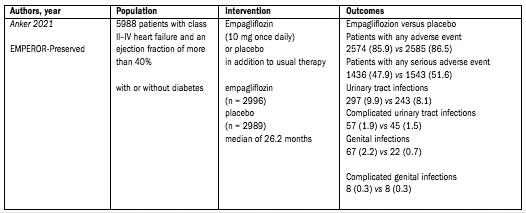
Rawa Bapir 1, 16 , Kamran Hassan Bhatti 2, 16 , Ahmed Eliwa 3, 16 , Herney Andrés García-Perdomo 4, 16 , Nazim Gherabi 5, 16 , Derek Hennessey 6, 16 , Vittorio Magri 7, 16 , Panagiotis Mourmouris 8, 16 , Adama Ouattara 9, 16 , Gianpaolo Perletti 10, 16 , Joseph Philipraj 11, 16 , Konstantinos Stamatiou 12, 16 , Musliu Adetola Tolani 13, 16 , Lazaros Tzelves 8, 16 , Stefan D. Anker 14 , Alberto Trinchieri 15, 16 , Noor Buchholz 16
1 Smart Health Tower, Sulaymaniyah, Kurdistan region, Iraq;
2 Urology Department, HMC, Hamad Medical Corporation, Qatar;
3 Department of Urology, Zagazig University, Zagazig, Sharkia, Egypt;
4 Universidad del Valle, Cali, Colombia;
5 Faculty of Medicine Algiers 1, Algiers, Algeria;
6 Department of Urology, Mercy University Hospital, Cork, Ireland;
7 Urology Unit, ASST Fatebenefratelli Sacco, Milan, Italy;
8 2nd Department of Urology, National and Kapodistrian University of Athens, Sismanoglio Hospital, Athens, Greece;
9 Division of Urology, Souro Sanou University Teaching Hospital, Bobo-Dioulasso, Burkina Faso;
10 Department of Biotechnology and Life Sciences, Section of Medical and Surgical Sciences, University of Insubria, Varese, Italy;
11 Department of Urology, Mahatma Gandhi Medical College and Research Institute, Sri Balaji Vidyapeeth, Puducherry, India;
12 Department of Urology, Tzaneio General Hospital, 18536 Piraeus, Greece;
13 Division of Urology, Department of Surgery, Ahmadu Bello University/Ahmadu Bello University Teaching Hospital, Zaria, Kaduna State, Nigeria;
14 Department of Cardiology and BCRT (Campus CVK), Charité Universitätsmedizin Berlin, Germany;
15 Urology School, University of Milan, Milan, Italy;
16 U-merge Ltd (Urology for emerging countries), London-Athens-Dubai *
Authors 1-16 have equally contributed to the paper and share first authorship
* U-merge Ltd (Urology for Emerging Countries) is an academic urological platform dedicated to facilitate knowledge transfer in urology on all levels from developed to emerging countries U-merge Ltd is registered with the Companies House in London/ UK www U-merge com
Supplementary Table 1.
Data extracted from the included studies (PICO Tables).
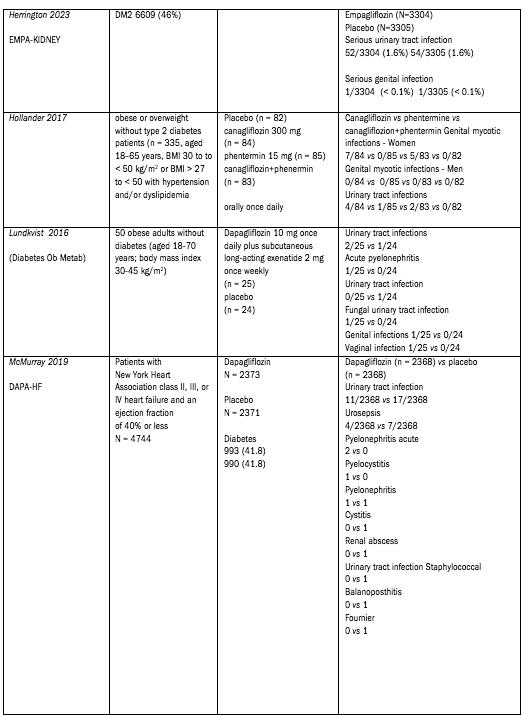
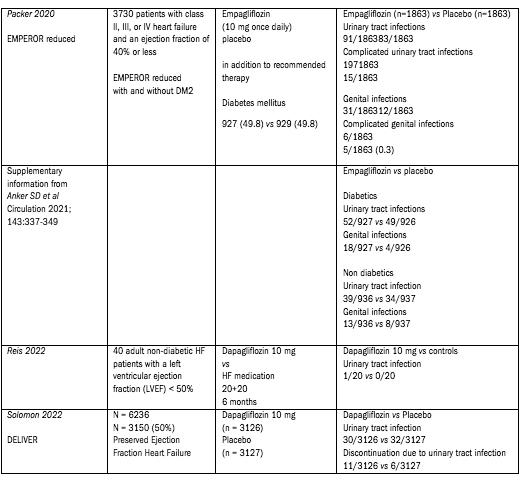
References
1 Anker SD, Butler J, Filippatos G, et al EMPEROR-Preserved Trial Investigators Empagliflozin in Heart Failure with a Preserved Ejection Fraction N Engl J Med 2021; 385:1451-1461
2 Abraham WT, Lindenfeld J, Ponikowski P, et al Effect of empagliflozin on exercise ability and symptoms in heart failure patients with reduced and preserved ejection fraction, with and without type 2 diabetes Eur Heart J 2021; 42:700-710
3 Bays HE, Weinstein R, Law G, Canovatchel W Canagliflozin: effects in overweight and obese subjects without diabetes mellitus Obesity (Silver Spring) 2014; 22:1042-9
4 Cherney DZI, Dekkers CCJ, Barbour SJ, et al DIAMOND investigators Effects of the SGLT2 inhibitor dapagliflozin on proteinuria in nondiabetic patients with chronic kidney disease (DIAMOND): a randomised, double-blind, crossover trial Lancet Diabetes Endocrinol 2020; 8:582-593
5 The EMPA-KIDNEY Collaborative Group; Herrington WG, Staplin N, Wanner C, et al Empagliflozin in Patients with Chronic Kidney Disease N Engl J Med 2023; 388:117-127
6 Hollander P, Bays HE, Rosenstock J, et al Coadministration of Canagliflozin and Phentermine for Weight Management in Overweight and Obese Individuals Without Diabetes: A Randomized Clinical Trial Diabetes Care 2017; 40:632-639
7 Lundkvist P, Pereira MJ, Katsogiannos P, et al Dapagliflozin once daily plus exenatide once weekly in obese adults without diabetes: Sustained reductions in body weight, glycaemia and blood pressure over 1 year Diabetes Obes Metab 2017;19:1276-1288
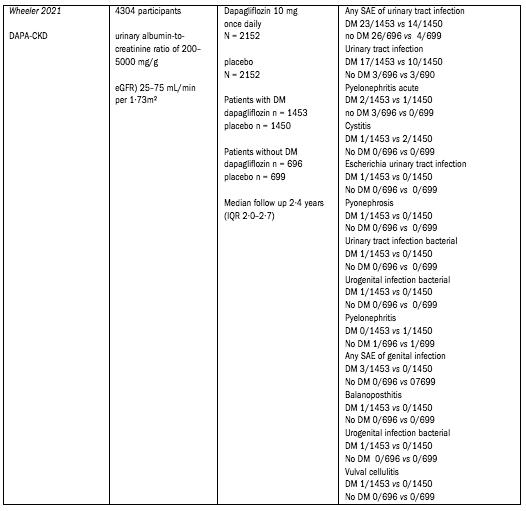
8 McMurray JJV, Solomon SD, Inzucchi SE, et al DAPA-HF Trial Committees and Investigators Dapagliflozin in Patients with Heart Failure and Reduced Ejection Fraction N Engl J Med 2019; 381:1995-2008
9 Packer M, Anker SD, Butler J, et al EMPEROR-Reduced Trial Investigators Cardiovascular and Renal Outcomes with Empagliflozin in Heart Failure N Engl J Med 2020; 383:1413-1424
10 Reis J, Teixeira AR, Gonçalves AV, et al Dapagliflozin Impact on the Exercise Capacity of Non-Diabetic Heart Failure with Reduced Ejection Fraction Patients J Clin Med 2022;11:2935
11 Solomon SD, McMurray JJV, Claggett B, et al DELIVER Trial Committees and Investigators Dapagliflozin in Heart Failure with Mildly Reduced or Preserved Ejection Fraction N Engl J Med 2022; 387:1089-1098
12 Heerspink HJL, Stefánsson BV, Correa-Rotter R, et al DAPA-CKD Trial Committees and Investigators Effects of dapagliflozin on major adverse kidney and cardiovascular events in patients with diabetic and non-diabetic chronic kidney disease: a prespecified analysis from the DAPA-CKD trial Lancet Diabetes Endocrinol 2021; 9:22-31
13 Nutzenbewertungsverfahren zum Wirkstoff Empagliflozin (Neues Anwendungsgebiet: chronische Herzinsuffizienz mit linksventrikulärer Ejektionsfraktion LVEF > 40%) https//www g-ba de /bewertungsverfahren/nutzenbewertung/810/
14 Anker SD, Butler J, Filippatos G, et al Effect of Empagliflozin on Cardiovascular and Renal Outcomes in Patients With Heart Failure by Baseline Diabetes Status: Results From the EMPEROR-Reduced Trial Circulation 2021; 143:337-349
Supplementary Figure 1
Risk Of Bias
Risk of Bias (RoB) 2 assessment of risk of bias in randomised control trialspresented The values at the right of the no-effect bar show higher odds of infection in diabetic patients
References
1 Sterne JAC, Savovic J, Page MJ, et al RoB 2: a revised tool for assessing risk of bias in randomised trials BMJ 2019;366:l4898
2 Lundh A, Gotzsche PC Recommendations by Cochrane Review Groups for assessment of the risk of bias in studies BMC Med Res Methodol 2008;8:22
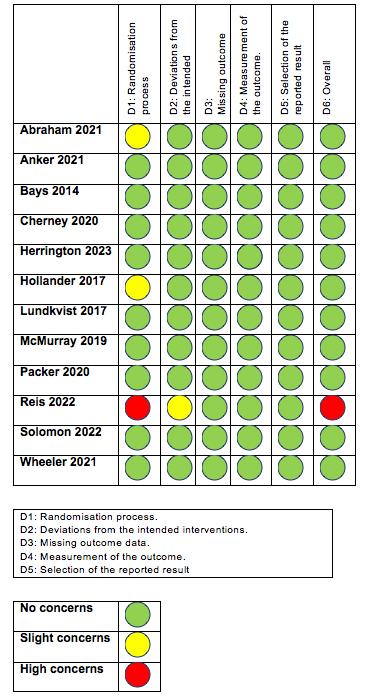
R Bapir, K Hassan Bhatti, A Eliwa, et al
Tools to assess study quality were tailored to study design The risk of bias in randomised control trials was assessed using the Risk of Bias (RoB) 2 assessment tool as prescribed by the Cochrane Methods 1,2 Data is shown in table S2 (Supplementary Table 2) Study quality was independently assessed by two reviewers (DH and HP) against pre-defined criteria Disagreements were resolved by discussion Risk of bias was not used to exclude studies We anticipated identifying too few studies to assess publication bias
Comments
Abraham - Slight differences between the two groups Domain 1 slight concer ns
Anker - No concer ns
Bays - No concer ns
Cherney - No concer ns
Herrington - No concer ns
Hollander - Single blinded study Domain 1 slight concer ns Small sample sizes
Lundquist - No concer ns
McMurray - No concer ns
Packer - No concer ns
Reis - Not blinded I am not sure the allocation sequence concealed until participants were enrolled and assigned to interventions also carers and people delivering the interventions were aware of participants' assigned intervention during the trial
Salomon - No concer ns
Wheeler - No concer ns
Urogenital infection and SGLT2 inhibitors
FUNNEL PLOTS
Supplementary Figure 2
Publication bias assessment in pooled analyses including at least 4 trials The effect size is presented as the logarithm of the odds ratios If missing studies (open orange circles) are imputed by the “trim-and-fill” analysis, adjusted odds ratios (red dots) and 95% confidence intervals are presented in the plots
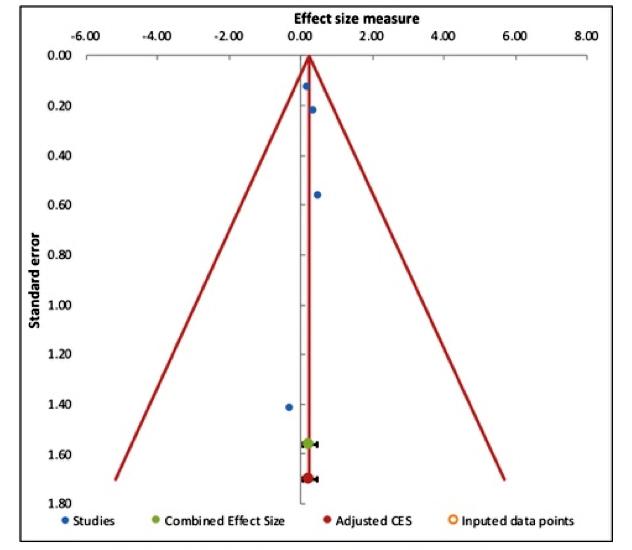
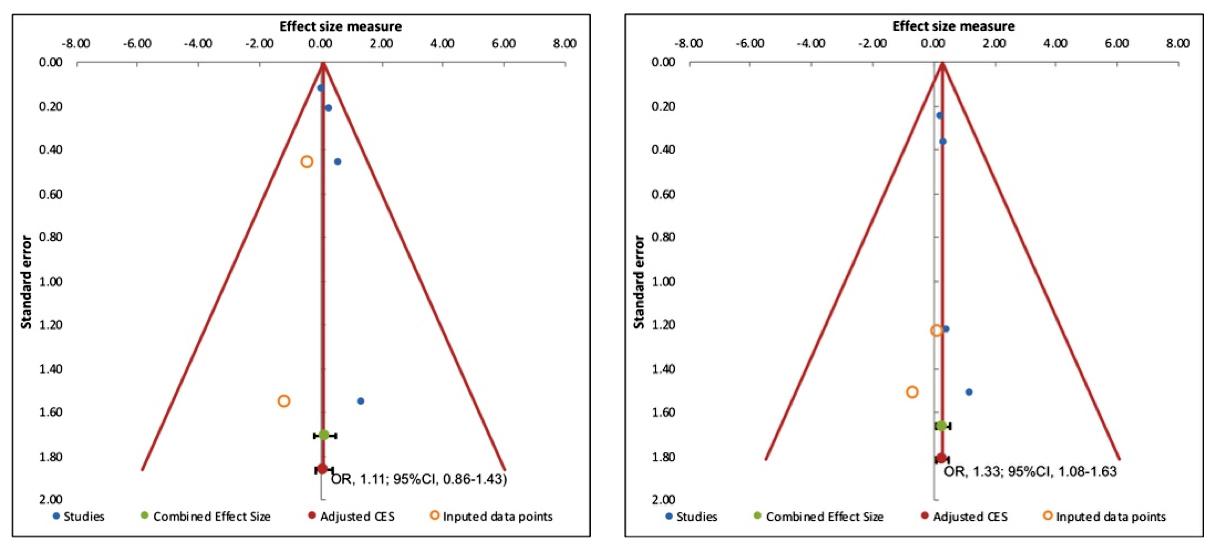
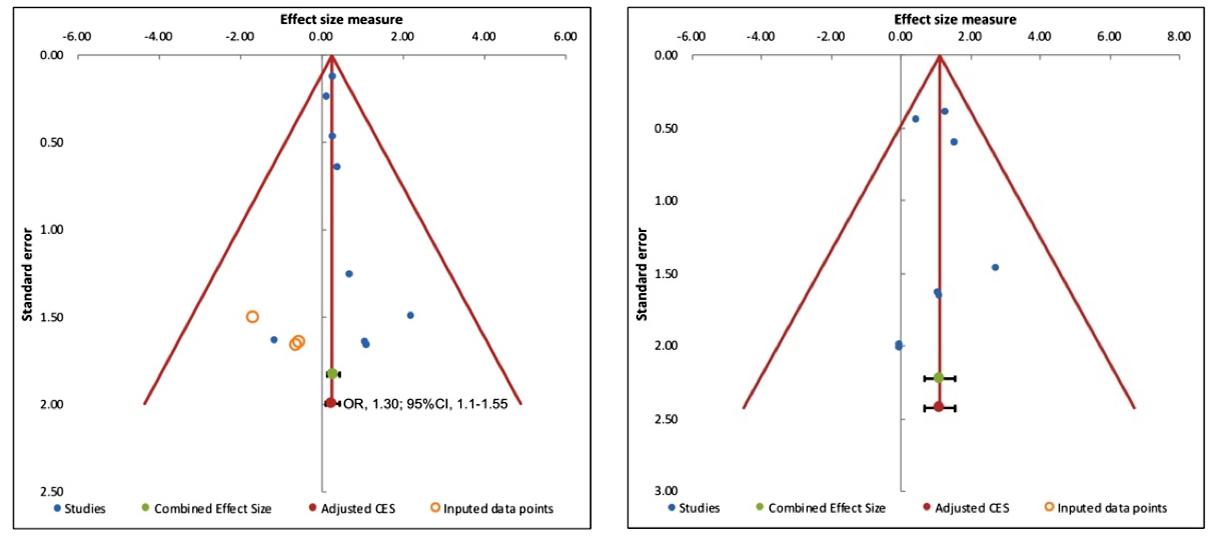
UTI in non-diabetics; SGLTi vs Placebo Genital infections in non-diabetics; SGLTi vs Placebo
UTI – Diabetics vs Non Diabetics; patients on SGLTi
Genital infections – Diabetics vs Non Diabetics; patients on SGLTi
UTI – Diabetics vs Non Diabetics; patients on Placebo
Summary Of Findings
Supplementary Table 2
Effect of SGLT2 inhibitors or placebo on urogenital infections
Patient or population: male or female patients with or without diabetes
Settings: outpatient
Comparison: placebo Outcome:
The corresponding intervention risk (and ts 95% conf dence interva ) s based on the assumed control r sk n the compar son group and the relative effect of the intervent on (and its 95% CI)
It is calcu ated from the odds ratio us ng the formu a: OR x ACR/[1-ACR + (OR x ACR)]
CI: Conf dence Interval; OR: Odds Ratio; ACR: Assumed Control Risk
GRADE Work ng Group grades of ev dence
High qua ity: Further research is very unl ke y to change our conf dence in the estimate of effect
Moderate qual ty: Further research is l ke y to have an mportant impact on our confidence in the estimate of effect and may change the estimate
Low qual ty: Further research is very likely to have an important impact on our confidence in the estimate of effect and s likely to change the estimate
Very low quality: We are very uncertain about the estimate





